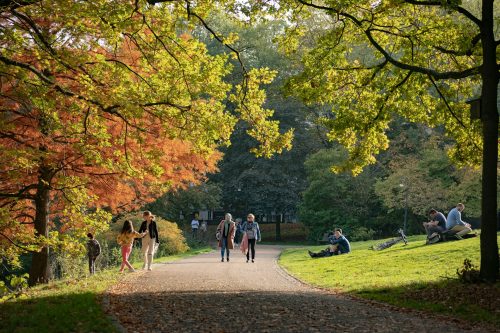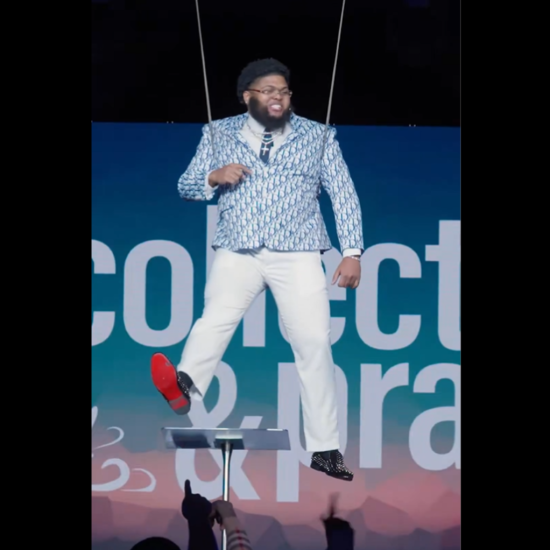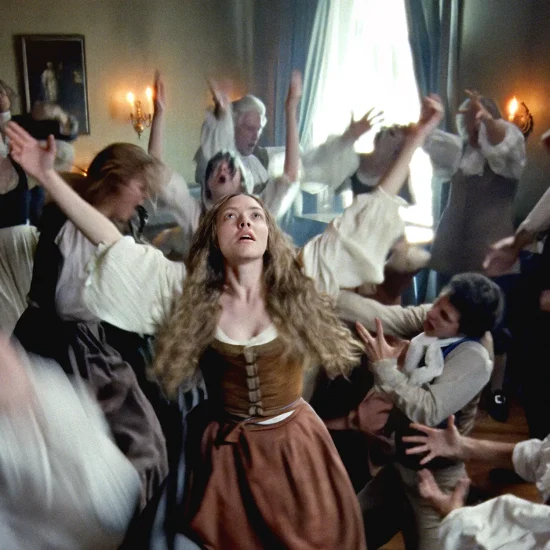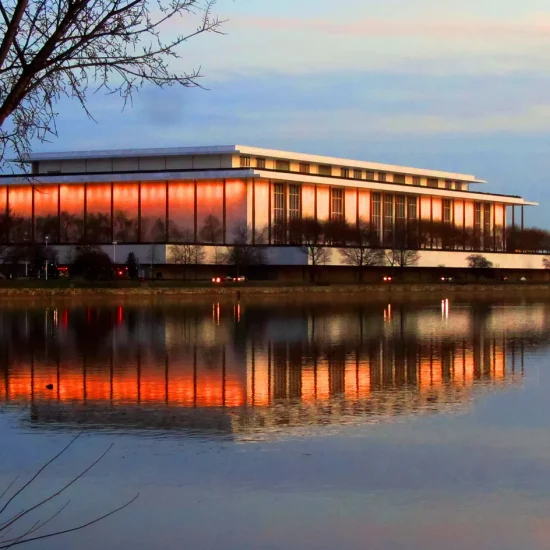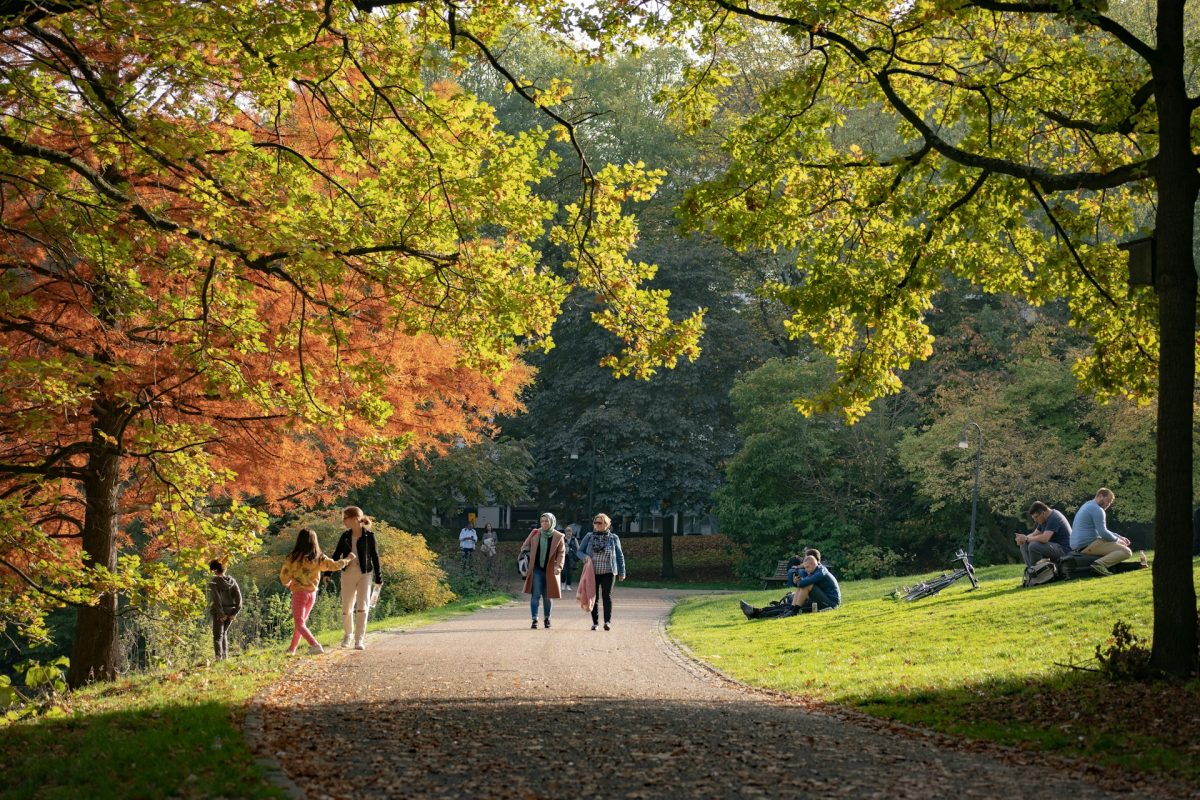
A motor-scooter zips by me, American flag flapping out in the breeze behind it, as an elderly vet raises his hand in acknowledgement. I do not know his name yet, but I can tell he recognizes me as one of the usuals. You see, I recently became a “regular” of sorts along a greenway near my home where I have been exercising during my son’s summer cross-country workouts. The greenway at 7 a.m. has its own motley crew of folks I see each morning. First comes the “good-morning man” who always has a Christian shirt or hat on and greets each person with a smile warm enough to make you want to drop everything and follow Jesus. There is the “multi-tasking mother” who manages with ease her weighted vest, a toddler in a stroller, and a dog on a leash. Thundering up behind me come the hordes of high school cross-country runners drumming their feet in unison. There is an elderly woman who meanders a bit on the walkway but is also content to sit on a bench and watch the urban parade of people go by. A terrier with the shortest legs walks briskly by, always with a little green ball in its mouth. Cyclists, joggers, and dog-walkers all make their way along the creek-side path, interrupted only by the occasional doe and her fawn cutting across in front of them.
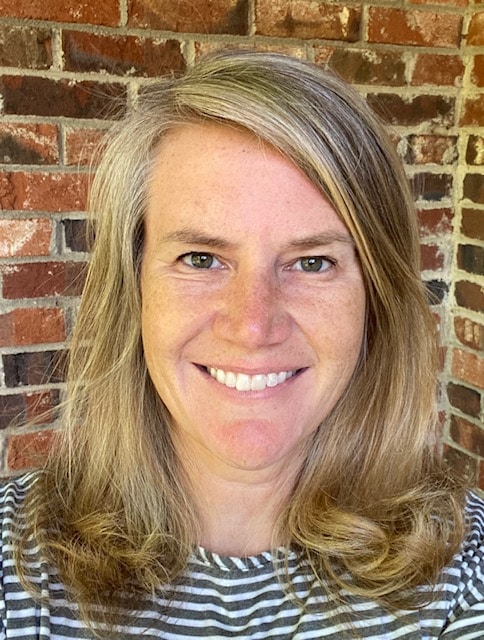
Rev. Dr. Sarah Blackwell
We recognize each other and exchange a head nod or a morning greeting, sometimes chatting about the oppressive heat of the summer or the rain that left giant mud puddles. We walk the same paths daily, but I would bet we live very different lives. Yet, there is a commonality and a sense of belonging and recognition. We appreciate together the serenity of the place, the commitment to physical exercise, and the dedication to the daily nature of our efforts. We note who is present and who we have not seen in a while. I remember my son telling me that he had not seen the “good-morning man” for several weeks and worried that something had happened to him. The relief when he saw him on the trail again one morning!
It reminds me of the classic opening of the television show Cheers, which begins with the iconic lyric: “Sometimes you want to go where everybody knows your name, and they’re always glad you came.” The close-knit group at the Boston bar harkens the arrival of George Wendt’s character each day with the exclamation of “Norm!” The premise of the show is the support that this ragtag group of people gives to each other through the years simply by showing up. It highlights the beauty of places where we are known outside of our home and our work. Unfortunately, these “third spaces” are dying out as the internet becomes the place that occupies most Americans’ leisure time. However, there is something beautiful, even sacred, about having third space communities. They do not just happen, though. The first step is committing to becoming a “regular.”
Finding public gathering places in which to become a regular (that won’t charge you north of $5 for a latte) has become increasingly difficult, though. Membership in community organizations is on the decline. Church membership is down. Even neighbors rarely see each other due to hectic schedules. When local governments are working best, they can help to facilitate safe third spaces like libraries and community centers. In 2018, Helsinki, Finland, opened the Oodi Library that combined all the typical offerings of a library along with a theater, restaurant, maker space, and a recording studio. It is a true center for the community. Committing to third spaces can have a dramatic positive impact on all involved. Many have posited that our current societal division has deepened due to our third spaces being online (and only with like-minded people) rather than in the mixed bag that was the public squares of previous generations.
Here is where the local church can make a major impact. Many of our churches have facilities that go underutilized outside our Sunday/Wednesday night weekly schedule. Churches can help facilitate these kinds of third spaces, but we must be creative and welcoming in our offerings. Not only do we need to show up, but we want to show the kind of welcome that makes people want to be regulars. One thing we noticed at our church is that our suburban enclave within the larger metropolitan area does not have a city park, a library, a community center, or a YMCA. Thus, we have sought ways to make available activities and spaces for our community to utilize. Neighbors of our church have taken to calling the grounds simply “the park.” The more comfortable a person feels in a place, the more they are likely to consider themselves part of what is going on there. Maybe your church is similar? How could it be a third space for others in the community?
Of course, the next crucial step is having people commit to being there. Maybe this fall is a good time to recommit to being a “regular” at your house of worship. The in-and-out membership that many have had since the pandemic has caused our close ties to become loosened. Being a regular is a beautiful part of living in community together. You simply must show up and be engaged. When we become regulars, we can better see and attend to the needs of others around us. We begin to live outside ourselves. Our best model of this, naturally, is God. Lamentations 3:22-23 says, “The steadfast love of the Lord never ceases; his mercies never come to an end; they are new every morning; great is your faithfulness.” We can learn to be faithful in showing up because God does this for us every day. And so, I tie on my shoes and head out the door to another morning on the greenway. Not because I must, but because I’d like to see my little community within my community. I want to make sure the “good-morning man” is there and give that mother a smile and word of encouragement. Maybe this will even be the day that I stop long enough to ask “motor scooter man” his name so that I can yell it in greeting each morning when I see him roll by, just like the Cheers folks did for Norm.
Rev. Dr. Sarah Blackwell is a contributing writer at Word & Way and a graduate of the Gardner-Webb School of Divinity and the McAfee School of Theology. She teaches in the Religion and Philosophy Department at Wingate University. She is a regular in the balcony at Providence Baptist Church-Charlotte. Her intergenerational faith formation book, God is Here is available through Amazon and other online book retailers. Follow her writings at proximitytolove.org.

